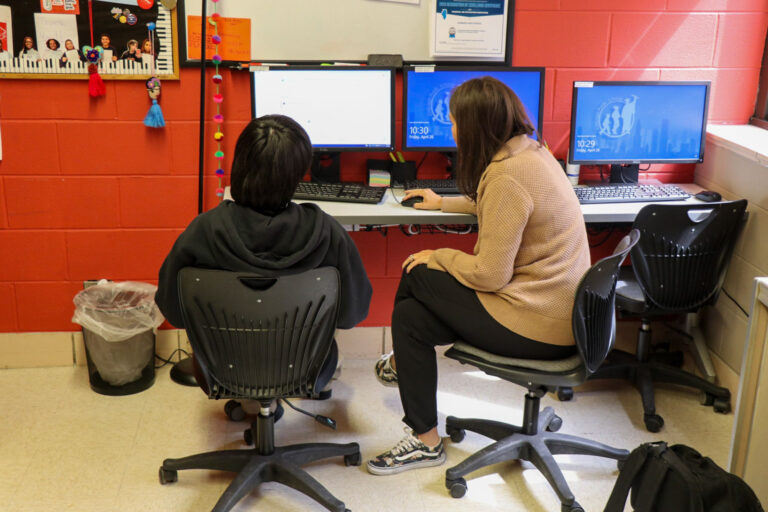If the current hype around artificial intelligence is to be believed, education is about to be transformed: highly available digital educators will soon replace human educators and deliver focused, personalized content to students.
It’s reminiscent of a troubling experiment from the 1960s, immortalized in a moving photograph: A clearly frightened baby monkey clutches a crude cloth replica of the mother it was taken from. Next to it is a roll of metal mesh with a feeding bottle attached. The metal mother feeds while the cloth mother sits motionless. But when stressed, the baby monkey turns to the latter for help.
Despite its tragic provenance, this image is relevant to a topical issue: What role should AI play in our children’s education? And in school counseling? Here’s one way to think about these questions:
AI systems, in their independent efficiency, are like metal mesh mothers: they can impart information but do little else. Human educators — teachers and school counselors with whom students build emotional bonds and trust — are like fabric mothers.
It would be foolish to replace these educators with digital educators. We don’t have to look too far back to make this case: just 10 years ago, we were caught up in the craze around MOOCs (instructional videos available to anyone over the internet).
“The End of Classroom Education!” and “A Tipping Point!” screamed breathless headlines. But the reality was less inspiring.
While MOOCs have played a useful adjunct role in education, human teachers remain key and face-to-face learning environments have proven essential. The failure of distance learning during the COVID-19 pandemic supports the same conclusion. A similar story is likely to play out (and we argue it should) in the field of AI and school counseling.
Related: Become a lifelong learner. Free Weekly Newsletter Get comprehensive reporting delivered straight to your inbox.
Guidance for children must be centered around caring adults. Counsellors play a vital role in helping students find their way through the maze of school. Their effectiveness depends on their expertise, empathy and ability to mentor students in times of doubt and stress.
At least, that’s how counselling is supposed to work. But the reality is that the counselling system is under serious stress.
The American School Counselor Association recommends a student-to-counselor ratio of 250 to 1, but the actual average for the 2022-23 school year, the most recent year for which data is available, was 385 to 1. In many schools, the ratio is much higher.
Even for the most dedicated counselors, this ratio means it’s impossible to spend a lot of time getting to know each student well. Counselors must focus on administrative tasks like schedule changes and urgent issues like mental health. This capacity constraint has a cascading effect, limiting counselors’ ability to provide individualized advice and recommendations.
Students are hesitant to ask these caring adults for further advice and support because they perceive the counselors as busy or overwhelmed with other crisis situations, while the counselors are assigned unrelated tasks such as lunch duty and attendance support, further distracting them.
In such depressing times, it is tempting to turn to AI as a savior. What if we could deploy generative AI systems as virtual counselors that students could interact with and get advice from? As many times as necessary, on any topic? For a fraction of the $60,000 annual salary of a typical human school counselor?
Given the exponential increase in the capabilities of AI systems in recent years, the answer to these questions appears to be yes. teeth This is a compelling case for using AI in school counseling. However, do not have One of the replacement items.
Related: Evidence point: AI essay grading is already ‘as good as overworked teachers,’ but researchers say more research is needed
AI is ideal for improving the counseling experience because it can process vast amounts of data and provide personalized recommendations. By analyzing data about students’ personalities and interests, AI can foster more meaningful interactions between students and counselors and lay the foundation for effective goal setting.
AI is also good at breaking down complex tasks into manageable steps and turning goals into action plans – tasks that are often time-consuming for human counselors but easy for AI, making it an invaluable ally during counseling sessions.
By leveraging AI to augment traditional approaches, counselors can have more time to provide critical social and emotional support and foster stronger mentorship relationships with students.
Incorporating AI into counseling services can also provide long-term benefits: AI systems can track recommendations and student outcomes, allowing the system’s performance to continually improve over time. Additionally, AI can stay on top of emerging trends in the job market, allowing counselors to provide students with cutting-edge guidance on future opportunities.
The AI add-on is also well-suited to adapt to students’ changing interests and goals over time, providing contextual suggestions and information on demand, such as courses or local internships.
With schools struggling with declining budgets and chronic absenteeism, integrating AI into counseling services offers a fantastic opportunity to optimize counseling sessions and establish support systems that go beyond traditional methods.
Yet this is an opportunity that must be approached carefully. Human counselors play an essential and irreplaceable role in helping students learn about themselves and explore their college and career options. By combining the power of AI with human strengths, counseling services can evolve to meet the diverse needs of students in highly personalized, engaging, and goal-oriented ways.
Izzat Jardi is Edifiis a startup supported by the U.S. Department of Education that provides digital guidance assistance to high school students and counselors. SBIR program. Pawan Sinha is a professor of neuroscience and AI at MIT and co-founder and chief scientist at Edifi. Carolyn Stone is a former president of the American School Counselor Association and contributed to this work.
This story about AI and school counselors is The Hechinger ReportA nonprofit, independent news organization focused on education inequality and innovation.. Apply Hechinger Newsletter.


